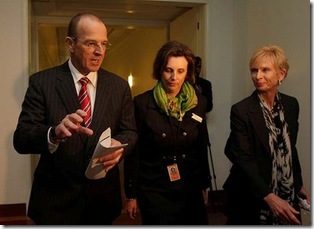Minister for Agriculture Senator Joe Ludwig
with RSPCA's Heather Neil and Animals Australia's Lyn White.
Photo: Alex Ellinghausen. From The Age
The Live Export trade to Indonesia becomes murkier and murkier as the days go by. The Four Corners program, A Bloody Business, aroused the horror and indignation of the nation. Australians cannot let this slide – as we can do very easily with so many issues.
It is a complex issue but, as more and more comes to light,one thing is clear. This issue has many sides to it. It seems to me that only some of the people and organisations who might be connected with this have come into public view. Michelle Grattan gives some clues.
It is a complex issue but, as more and more comes to light,one thing is clear. This issue has many sides to it. It seems to me that only some of the people and organisations who might be connected with this have come into public view. Michelle Grattan gives some clues.
Another place to explore is the Hansard report of the Estimates session of the Senate Rural Affairs and Transport Legislation Committee held on 24 May 2011 in the week prior to the 4 Corners telecast.
I have made provision below for downloading this report. I have also taken some extracts from the Hansard for Networkers who don’t want to download such a large document. Details in these extracts can keep you researching for a substantial time.
I have made provision below for downloading this report. I have also taken some extracts from the Hansard for Networkers who don’t want to download such a large document. Details in these extracts can keep you researching for a substantial time.
Meat & Livestock Authority is the organisation that is front and centre in all this and who certainly has a great deal of explaining to do – and so far any explaining they have done is not all that wonderful.
Among the people and organisations we need to hear from are:
- The Department of Agriculture, Fisheries and Forestry and the units within that department.
- Animal Health Australia could have something to contribute. Steve Vizard’s brother, Associate Professor Andrew Vizard, is a vet and a direct of AHA.
Ass Prof Vizard’s bio says that he has and interest in the“production risk in the grazing industries”. Perhaps he considers that his interest does not extend to live export of sheep and cattle and does not include the slaughter of exported animals in Indonesia. However, as someone close to the industry and with a professional interest animals, it might be a good idea to hear from him.
My view is that we need some extensive research on this which could provide, as an end result, a timeline of who knew what when leaving no one out whether that be governments, political parties, political representatives, bureaucrats, industry organisation.
The Howard Government held a Royal Commission under the heading of an Inquiry into certain Australian companies in relation to the UN Oil-For-Food programme in connection with alleged corruption connected to the Australian Wool Board (AWB). Do Networkers think that the animal cruelty exhibited in the live export trade warrants a Royal Commission? Let me know your views in the comments section as well as in the poll at the top of the sidebar.
I am aware of the old adage which says to governments not to call a Royal Commission unless they know what the answer is going to be. I know, particularly after the revelations and non-revelations from the AWB and bureaucrats within the Department of Foreign Affairs and Trade, that the end result of Royal Commissions is not always what one might wish.
What a Royal Commission does provide is judicial coercion to appear and answer. In the hands of a determined judicial investigator (I think more of Fitzgerald than Cole). Even when there is papering over and obfuscation – as happened with much testimony before the Cole Inquiry – the general public can still make up its own mind. The material and evidence presented provides signposts to a concerned and committed government about changes, necessary legislation, bureaucratic duck-shoving and so on.


No comments:
Post a Comment
This blog does not take Anonymous comments. Experience shows that comments cluttered with "Anonymous" are boring and people don't know whether "Anonymous" is one person or many. This is not a decision about freedom of speech. It is a decision about boring or unwillingness to be known by even a pseudonym.